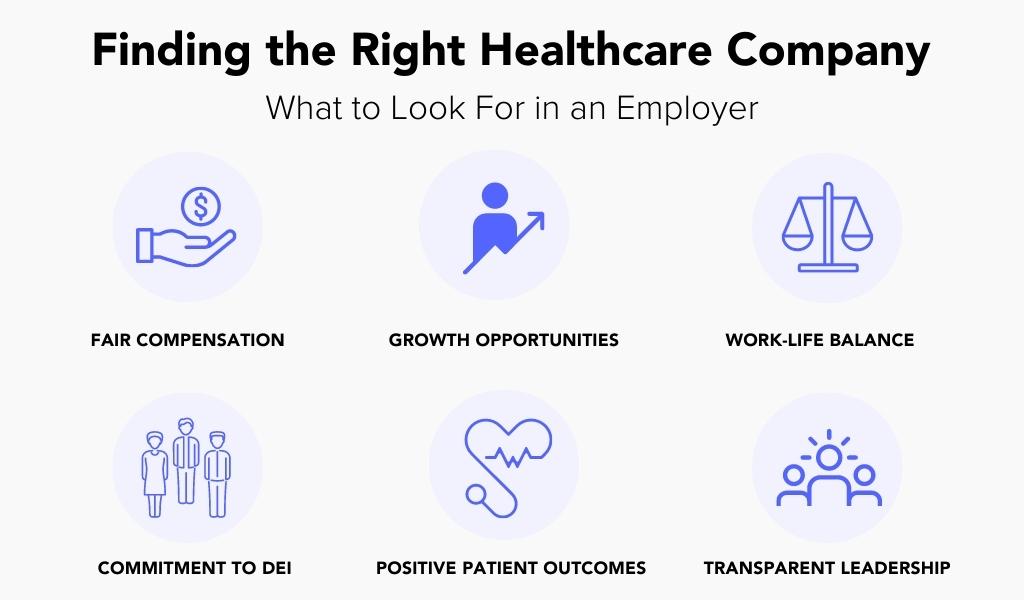As the industry continues to face unprecedented challenges and workforce shortages, finding the best healthcare companies to work for is becoming increasingly important for workers in the field.
Employees across the industry work tirelessly to provide care for patients, often at the expense of their own health and happiness. According to a recent study by Mental Health America, 91% of healthcare workers reported experiencing stress, and 81% reported experiencing exhaustion and burnout due to their work. While the healthcare industry has always faced some degree of workforce challenges, the labor shortage has increased dramatically over the last three years. The current turnover rate for healthcare workers in hospitals is around 25.9%, putting additional strain on employees and organizations.
Finding an employer with a positive workplace culture can have a significant impact on healthcare workers’ mental health, work-life balance, and overall job satisfaction.
Here’s what healthcare workers need to know about finding the right organization.
How to find the best healthcare companies
Assessing workplace culture is a critical aspect of finding the right employer. Honing in on organizations with priorities that match yours before you accept a job offer can lead to a better overall experience.
When applying for a job, jobseekers can evaluate workplace culture by:
- Researching the company: Before applying for a job, it’s important to research the company thoroughly. Look for information on the company’s mission, values, and culture. Check the company’s website, social media pages, and profiles on employer transparency platforms.
- Reading reviews online: Trustworthy review sites can provide insight as to what it is like to work at a company, where they can improve, and where they excel.
- Looking for red flags: During the job search, be aware of any red flags that might indicate a negative workplace culture. For example, if the interviewer seems unprofessional or disorganized, it could be a sign of a chaotic work environment.
- Asking questions during the interview: Don’t be afraid to ask questions about the company’s culture during the interview. For example, you could ask about the company’s management style, how employees collaborate, or what the company does to promote work-life balance.
- Talking to current employees: If possible, try to speak with current employees at the company to get a better sense of the workplace culture. You could reach out to former colleagues or use LinkedIn to connect with current employees.
By evaluating workplace culture during the job search process, job seekers can find an employer that aligns with their values and needs.

What to look for in a healthcare company
When researching potential employers in the healthcare field, here are six things to be on the lookout for.
1. Competitive compensation and benefits
Healthcare professionals are in high demand, and it’s important to be fairly compensated for your skills and expertise. Inadequate compensation is one of the biggest stressors of work, so looking for healthcare organizations that offer competitive compensation and benefits packages— including healthcare coverage, retirement plans, and paid time off— is important.
2. Opportunities for professional development and growth
Healthcare is a rapidly evolving field, and it’s important for employees to stay up-to-date with the latest advancements and practices. Professional development can help you stay current in your field and position yourself for future career opportunities.
Similarly, growth opportunities within the company are important to consider when evaluating potential employers. These upward paths provide opportunities for career development, financial rewards, and motivation, ultimately leading to greater job satisfaction. A company that prioritizes their employees’ career trajectories also shows a commitment to retaining top talent, creating a positive work environment, and investing in employee development.
Look for healthcare organizations that offer opportunities for employees to grow and develop their careers, such as continuing education programs, mentorship opportunities, and leadership development programs.
3. Emphasis on work-life balance
Healthcare professionals often work long hours and deal with high levels of stress, making work-life balance a big priority for most. Benefits be an indicator of an organization’s priorities. Look for offerings like:
- Employee wellness programs
- Mental health resources
- Flexible work arrangements
- Generous paid time off
- Parental leave
While the fact that a company offers these benefits doesn’t necessarily guarantee a healthy work-life balance, they are a good indicator that an employee’s well-being and time outside of work is valued by the organization.
4. Commitment to diversity, equity, and inclusion
No one wants to work in an environment where they don’t feel welcomed, valued, or included.
Diversity and inclusion are essential factors to consider when jobseekers are searching for the right employer in any industry, including healthcare. An inclusive work environment will value and respect people’s differences, regardless of their race, ethnicity, gender, age, religion, or other characteristics.
To assess a company’s commitment to DEI, jobseekers can:
- Review the company’s inclusion track record
- Look for diversity in leadership
- Check out the company’s policies and benefits
- Research the company’s recruitment practices
A diverse and inclusive workplace can lead to more creativity, innovation, and problem-solving, as employees bring different perspectives and ideas to the table.
5. Positive patient outcomes
Healthcare professionals work to improve the health and well-being of their patients, so it’s important to consider healthcare organizations that have a strong track record of providing high-quality care. Look for organizations with positive patient outcomes, such as high patient satisfaction scores and low readmission rates.
6. Transparent and effective leadership
Effective leadership is important in healthcare to ensure that employees are supported and patient care is prioritized. Finding healthcare organizations with transparent and effective leadership can be a good sign of a positive workplace culture. This can be assessed by researching the organization’s leadership team and their track record, as well as reading about or asking current employees about their experiences with leadership.
The bottom line
Finding the right healthcare employer is critical for healthcare workers’ mental health, work-life balance, sense of purpose, and overall job satisfaction. By evaluating a healthcare organization’s commitment to transparency while job hunting, you can set yourself up for success and a thriving career.
